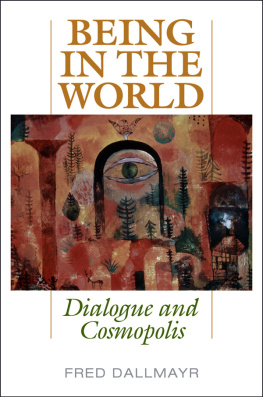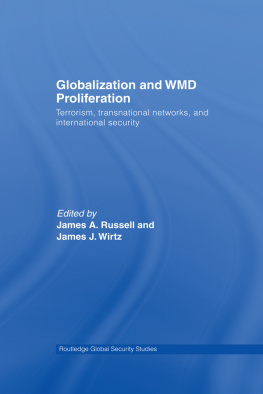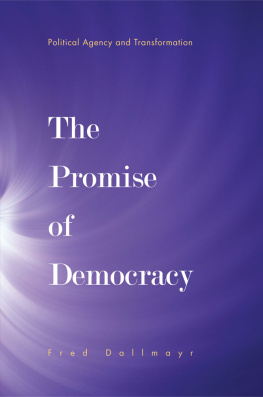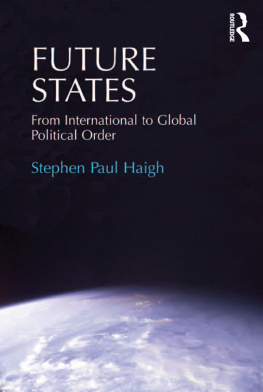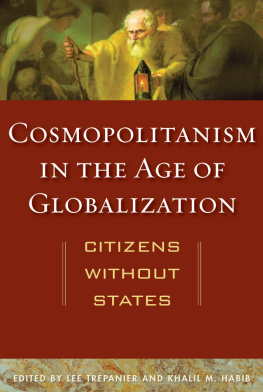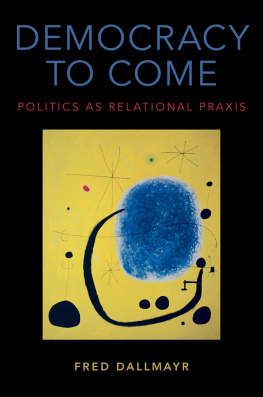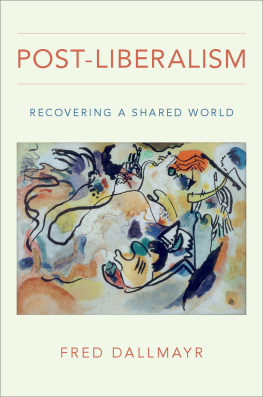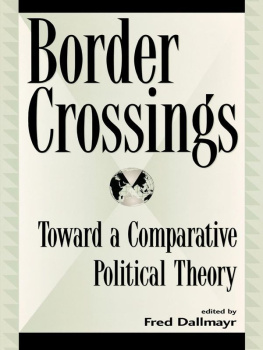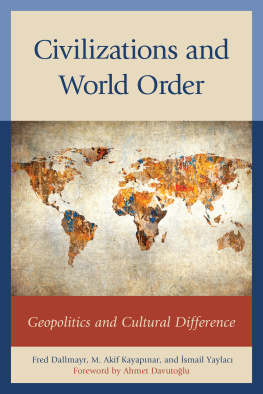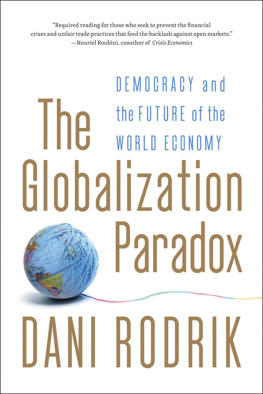
Being in the World
B EING
IN THE
W ORLD
Dialogue and Cosmopolis
FRED DALLMAYR

Copyright 2013 by The University Press of Kentucky
Scholarly publisher for the Commonwealth,
serving Bellarmine University, Berea College, Centre College of Kentucky, Eastern Kentucky University, The Filson Historical Society, Georgetown College, Kentucky Historical Society, Kentucky State University, Morehead State University, Murray State University, Northern Kentucky University, Transylvania University, University of Kentucky, University of Louisville, and Western Kentucky University.
All rights reserved.
Editorial and Sales Offices: The University Press of Kentucky 663 South Limestone Street, Lexington, Kentucky 40508-4008 www.kentuckypress.com
17 16 15 14 13 5 4 3 2 1
Cataloging-in-Publication data is available from the Library of Congress.
ISBN 978-0-8131-4191-6 (hardcover : alk. paper)
ISBN 978-0-8131-4192-3 (epub)
ISBN 978-0-8131-4193-0 (pdf)
This book is printed on acid-free paper meeting the requirements of the American National Standard for Permanence in Paper for Printed Library Materials.

Manufactured in the United States of America.
 | Member of the Association of
American University Presses |
For Josefine and Keegan
May their being in this world be filled with happiness and blessing
Peace is not an absence of war; it is a virtue, a state of mind, a disposition for benevolence, confidence, justice.
Spinoza
Among nations, a common feeling must gradually awaken, so that each can feel itself to be in the place of the other.
Johann Gottfried Herder
Beauty is in the ideal of perfect harmony which dwells in universal being.
Rabindranath Tagore
Our task must be to free ourselvesby widening our circle of comparison to embrace all living creatures and the whole of nature and its beauty.
Albert Einstein
Preface
A picture, the saying goes, is worth more than a thousand words or verbal explanations. In the following, I want to present a picture and then ask: What is wrong with the picture? Imagine a country in which most of the people are said to be religious or God-fearing. Many or most of the people carry Gods name on their lips incessantly or at least on all important occasions. You might say that this is a happy or devout condition. But now add this to the picture: Many or most people in the same country have a gun or several guns and are ready to use these guns to maim or kill fellow citizens at the slightest provocation. Moreover, even when not using guns, they hurl against each other vile and hateful language that even gangsters or streetfighters would be hesitant to employ. What is wrong with this picture?
To make things still worse, imagine that the country in which these people live stockpiles large amounts of weapons of mass destruction with which to slaughter other populations. Most lethal among them is the arsenal of nuclear weapons with which entire continents and even the whole world can be annihilated many times over. Perhaps the coherence of the picture might be salvaged if we assumed that the country was populated by barbarians or criminals for whom warfare and wanton killing is a natural way of life. But this was not our initial assumption. Hence, the question remains: How can a country inhabited by supposedly God-fearing people mesh or be made compatible with the other features I mentioned? The answer is that it cannot.
It cannot as long as people still remember scriptures and the lessons contained therein. One such lesson is contained in the Sermon on the Mount. There we are told, in plain language (Matthew 5:2124): You have heard that it was said to the men of old, You shall not kill; and whoever kills shall be liable to judgment. But, the sermon continues: I say to you that every one who is angry with his brother shall be liable to judgment; whoever insults his brother shall be liable to council and whoever says You fool! shall be liable to damnation. And then comes perhaps the most important instruction: If you are offering your gift at the altar, and there remember that your brother has something against you, leave your gift there before the altar and go: first be reconciled to your brother, and then come and offer your gift. This means: we cannot worship God or bring gifts to the divine as long as we are at enmity with our brothers and sisters; we cannot be faithful to God if we are not faithful to our fellow beings or at least make every effort to be reconciled to them.
This booklike other things I have put to paperis written from anguish: anguish about the future possibility of life on Earth; about the prospect of a decent, humane, and just being-in-the-world. This future is jeopardized today by a combination of threats: the threat of large-scale war fueled by reckless power lust; the danger of economic meltdowns promoted by boundless greed; and the peril of ecological disasters nurtured by the desire for instant gratification and consumption. Among these dangers, the threat of nuclear holocaust is surely the most dauntingand also most shocking in a halfway sane world. Have we not seen the utter and brutal devastation in Hiroshima and Nagasaki? Have we not visited the Peace Park and pledged: Never again? Thus, who can contemplate a nuclear war and still claim to be human? In their total denial of humanity, nuclear weapons are simply unusable by human beingsby beings living not against but in and with the world.
The chapters in this book are all committed to the celebration of life and, more particularly, the quest for a good and just life in our contemporary world. In our globalizing context, this quest cannot be pursued in a unilateral, hegemonic, or imperial manner. Only through sustained dialogue and engaged multilateral interactions can we catch a glimpse of cosmopolis, of the just and harmoniously ordered global city promised in all scriptures and philosophical meditations. This city is a place of longing, a hope sustaining all genuine travelers along the way. It is also a place of beauty, a radiant cosmos or comic vision. As the psalmist says: How beautiful is your dwelling place (84:1). Safety or security in this city is not obtained through walls, high fences, or military armaments, but through mutual respect and good neighborly conduct.
To be sure, such a cosmopolis cannot be fabricated or engineeredbecause its encompassing wholeness (and haleness) vastly exceeds our grasp. Nor, however, does it befall us like a fortuitous accident, like a meteor from outer space, unrelated to our thinking and doing. The chapters in this book do not and cannot present a blueprint of cosmopolis; they are far removed from any intention to reconstruct the Tower of Babel. Yet, from different angles, in different idioms, with different thematic accents, they all point in a certain directionincessantly and (if you will) prayerfully. They do not articulate a doctrine or systematic theory that could be routinely memorized or recited. They are simply invitations to remain on the way. This, in my view, is what all our thinking and acting are meant to do: not to display a pretentious knowledge but to bear witness to a certain loyalty, a loyalty to the call of peace and justice.
Next page
